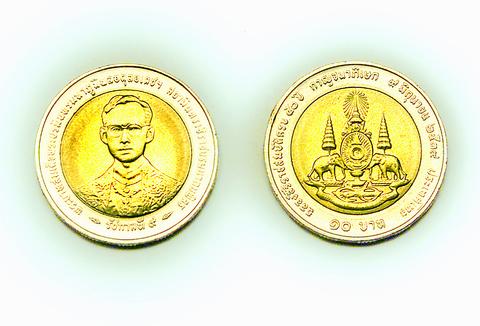Demand for Thailand's 10 baht coins has rocketed following reports that these can be used in vending machines in Europe that accept the new euro currency.
The Thai coin is reportedly almost identical to the 2 euro coin in weight and size, but it is worth about one-seventh its European look-alike. Ten baht is worth roughly 0.26 euros (just over US$0.20).
Staff at currency exchange booths at Bangkok's international airport said Saturday that the sudden upsurge of demand for the 10 baht coin started about three weeks ago.

PHOTO: AP
"Dozens of tourists, mostly Westerners, specifically asked for 10 baht coins. Some of them wanted as many as 50 coins," said Anucha Krut-hern, staffing the Thai Military Bank booth at the airport's departure terminal.
Anucha said she was initially surprised because he figured most travelers would not want to carry heavy coins with low value out of the country. The answer he got from some he queried was that they were "just a souvenir."
Currency exchange staff of the Bangkok Bank and Krung Thai Bank, who asked not to be named, told the same story.
The tellers said their banks later issued orders not to dispense large amounts of the coins to tourists since they might be misused in European vending machines which reportedly cannot differentiate between the 10 baht and 2 euro coins.
The Bangkok Post Saturday quoted an official of the Treasury Department as saying that 559 million 10-baht coins were currently in circulation and the department had no plans to take action.
"The fact that our 10 baht coin is similar to the 2 euro coin is the problem of the European Union, not Thailand," Thevan Vichitakul, deputy chief of the department, told the daily newspaper.
Both coins weigh the same but the Thai coin is slightly larger. The metallic contents of the two coins are different. A EU official in Bangkok said the European Central Bank was aware of the problem. But Thailand had not been blamed for the confusion or asked to withdraw its coins.
"There are so many coins in circulation from different countries, that it's impossible for them all to be completely different," the European Commission spokesman said.
"If vending machine operators find foreign coins in their machines, it's up to them to change their software," he said.The euro made its debut as the official EU currency Jan. 1.
In the meantime, European tourists returning home are stocking up on the Thai coins where they can. One German tourist, finishing some beers before heading for the airport Friday night, asked for change in the 10 baht coins "just to see if they worked."
The Catalan daily, El Periodico, reported last week that the owner of a bar in northern Spain had found five 10 baht coins recently when he emptied his automatic cigarette machine.
"How could the European Union have made such a mistake?" asked Alegandro Diaz, the manager of the bar in Mollet.

IN THE AIR: While most companies said they were committed to North American operations, some added that production and costs would depend on the outcome of a US trade probe Leading local contract electronics makers Wistron Corp (緯創), Quanta Computer Inc (廣達), Inventec Corp (英業達) and Compal Electronics Inc (仁寶) are to maintain their North American expansion plans, despite Washington’s 20 percent tariff on Taiwanese goods. Wistron said it has long maintained a presence in the US, while distributing production across Taiwan, North America, Southeast Asia and Europe. The company is in talks with customers to align capacity with their site preferences, a company official told the Taipei Times by telephone on Friday. The company is still in talks with clients over who would bear the tariff costs, with the outcome pending further

NEGOTIATIONS: Semiconductors play an outsized role in Taiwan’s industrial and economic development and are a major driver of the Taiwan-US trade imbalance With US President Donald Trump threatening to impose tariffs on semiconductors, Taiwan is expected to face a significant challenge, as information and communications technology (ICT) products account for more than 70 percent of its exports to the US, Chung-Hua Institution for Economic Research (CIER, 中華經濟研究院) president Lien Hsien-ming (連賢明) said on Friday. Compared with other countries, semiconductors play a disproportionately large role in Taiwan’s industrial and economic development, Lien said. As the sixth-largest contributor to the US trade deficit, Taiwan recorded a US$73.9 billion trade surplus with the US last year — up from US$47.8 billion in 2023 — driven by strong

A proposed 100 percent tariff on chip imports announced by US President Donald Trump could shift more of Taiwan’s semiconductor production overseas, a Taiwan Institute of Economic Research (TIER) researcher said yesterday. Trump’s tariff policy will accelerate the global semiconductor industry’s pace to establish roots in the US, leading to higher supply chain costs and ultimately raising prices of consumer electronics and creating uncertainty for future market demand, Arisa Liu (劉佩真) at the institute’s Taiwan Industry Economics Database said in a telephone interview. Trump’s move signals his intention to "restore the glory of the US semiconductor industry," Liu noted, saying that

AI: Softbank’s stake increases in Nvidia and TSMC reflect Masayoshi Son’s effort to gain a foothold in key nodes of the AI value chain, from chip design to data infrastructure Softbank Group Corp is building up stakes in Nvidia Corp and Taiwan Semiconductor Manufacturing Co (TSMC, 台積電), the latest reflection of founder Masayoshi Son’s focus on the tools and hardware underpinning artificial intelligence (AI). The Japanese technology investor raised its stake in Nvidia to about US$3 billion by the end of March, up from US$1 billion in the prior quarter, regulatory filings showed. It bought about US$330 million worth of TSMC shares and US$170 million in Oracle Corp, they showed. Softbank’s signature Vision Fund has also monetized almost US$2 billion of public and private assets in the first half of this year,